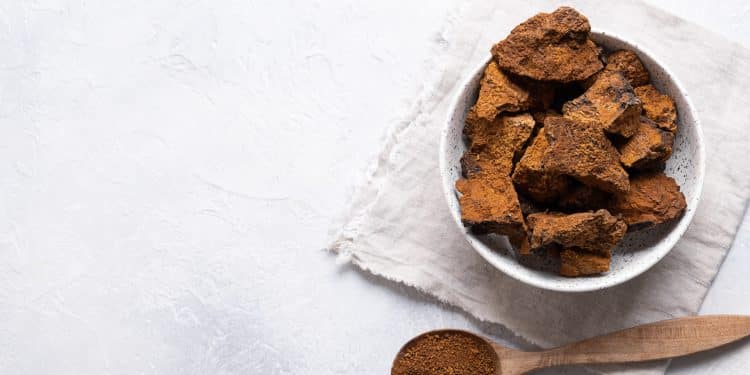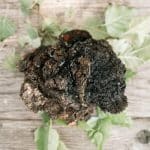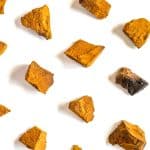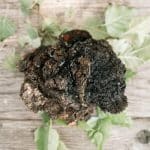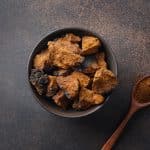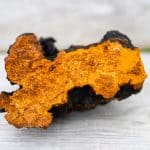As a pregnant woman, you are carrying a whole extra life within yourself. Because of that, you need to be concerned with more than your own life when thinking about your diet and supplement routine. What you eat should be also safe for the little one growing inside of you.
After going through your pregnancy and having a baby, breastfeeding your son or daughter is the next step. Just as you did when you were expecting, you need to be careful about what you are eating because you do not want compounds that could hurt the baby ending up in the breast milk.
Chaga mushrooms have made their name because they contain numerous nutrients, including vitamins and minerals, which provide a number of benefits. In addition, carrying bioactive compounds, Chaga mushrooms have a variety of health benefits.
However, any women who are pregnant or nursing children would like to know whether or not this medicinal mushrooms growing on Birch trees would be safe for their young children, newborns, or babies in the womb.
Below, we discuss Chaga’s benefits to breast-feeding, as well as its benefits during pregnancy. In addition, we will discuss whether or not Chaga is OK to be taken during breastfeeding and during pregnancy.
Is Chaga Safe During Pregnancy?
We cannot say with confidence that using chaga in pregnancy is safe because there is not enough research. However, if you are not allergic, chaga is safe for you to consume, thereby meaning it can be safe to take during pregnancy with the supervision of your physician.
If you wish to consume it while pregnant or nursing, for that matter, it is best to consult with a healthcare professional. That is, if you do wish to consume chaga tea or chaga supplements while pregnant, there are some things to take into consideration.
The quality of Chaga depends on what kind of tree from which the mushrooms are taken. Chaga is typically found growing on Birch, Ash, or Maple trees. All are excellent, but the chaga that comes from the birch is the one that is recommended the most as it will be the most potent in regards to containing the beneficial compounds.
If a tea is made with the mushroom growing on top of polluted soil, then it could have contaminants in it, which could impact you and your child. So you should only use the highest quality products.
Is Chaga Safe While Breastfeeding?
There is no scientific study or evidence to suggest that Chaga is ok to consume while breastfeeding. Therefore, it is recommended that you should check with your healthcare provider if you are breastfeeding and wish to use chaga as a tea or supplement, to be on the safe side.
What Health Benefits Does Chaga Have With During Pregnancy?
During pregnancy, some women experience certain health problems. However, a pregnant woman may take Chaga once she has received approval from her doctor. Thus, a pregnant woman may benefit from the mushroom’s therapeutic properties. Below, we look at a few issues that pregnant women can address using Chaga.
1. Chaga Can Help Prevent Gestational Diabetes
As you probably have guessed, gestational diabetes is a type of diabetes that can occur in healthy women during pregnancy. According to the CDC, gestational diabetes affects up to 10% of all pregnancies in the U.S. leading to problems including:
- The baby can grow extremely large at birth. For instance, your baby might weigh over nine pounds, which will make it hard to deliver.
- Your baby may have been born prematurely. This may lead to respiratory problems and other complications.
- The infant can later on develop Type-2 diabetes.
The good news is you can lower your risk for gestational diabetes. Also, Chaga offers benefits for diabetes, and it is known that this mushroom helps control blood sugar. Since gestational diabetes is usually the result of insulin resistance, which often impacts on blood sugar control, eating Chaga increases the body’s reception and response of insulin, keeping blood sugars in check, thus decreasing your risk for developing high blood sugar levels. However, although chaga products can be generally safe to consume while pregnant, you will want to speak with your healthcare provider before using these medicine mushrooms to avoid any potential side effects.
2. Chaga May Help With Gestational High Blood Pressure
This condition occurs when a woman experiences elevated blood pressure while pregnant, with no other heart or renal problems, proteins in her urine, or anomalies. It is typically discovered after 20 weeks gestational age or right before birth. After delivery, gestational hypertension typically goes down. However, some pregnant women who have high blood pressure are at increased risk for developing chronic high blood pressure later on as well as:
- High gestational blood pressure may block blood flow to important organs of the mothers body, including the placenta, uterus, brain, kidneys, and liver.
- Gestational hypertension may affect the baby adversely, leading to problems such as low fetal growth and stillbirth.
- If left untreated, high gestational blood pressure can lead to a dangerous seizure (eclampsia).
- In extreme cases, this can lead to death for both parents and baby.
Taking chaga mushrooms helps to treat high blood pressure. The mushroom helps pregnant women keep their blood pressure levels at normal levels, helping them to avoid the transition to gestational hypertension. However, we want to encourage you to speak with your healthcare provider if you suspect that you are already experiencing high blood pressure during pregnancy. Properly managing gestational high blood pressure may require using extra medications.
3. Chaga Can Help With Gestational Skin Problems
Pregnancy is known for its effects on your skin. For women looking to keep their skin healthy while pregnant, Chaga helps to improve the health of your skin. The mushrooms polysaccharide compounds, antioxidants, adaptogens, and other bioactive compounds combat the toxins that frequently damage skin. This keeps your skin healthy throughout and after pregnancy.
If you are pregnant and are concerned with the Chaga identification, as you think that you need to locate the mushroom in a forest in order to use it for improving the health of the skin, this is something that you do not need to do as there are many great products available that contain chaga. We always advise against wild-harvested Chaga, because you might be choosing toxic mushrooms that could be harmful to your health as well as that of your child.
4. Drink Chaga Tea To Prevent Gestational Weight Gain
A significant number of women gain weight while pregnant. Pregnant women typically gain between 25 to 35 pounds during the nine months they are carrying the child. While weight gain in pregnancy may be considered healthy, some women will gain more than recommended. According to CDC, 48% of pregnant women gain more than recommended weight.
This indicates the need for controlling weight gain in pregnancy. While walking and other forms of exercise can help you stay within a healthy weight range throughout pregnancy, it is not the only thing that you will need to do.
You will also need to make improvements in your diet. Chaga helps in weight loss, eating this mushroom may help keep off extra pounds. All you have to do is learn how to use the powdered chaga and mix it in with other healthy foods that you are going to consume throughout your pregnancy.
5. Chaga May Help With Gestational Hair Loss
Pregnancy comes with hair problems too. Some women might experience thinning hair and hair falling out because of stress or injury. Telogen effluvium is the name for the condition that occurs in pregnant women.
The body can feel stressed during the first trimester, because the hormones are changing dramatically in order to support a developing fetus. Thirty percent or more of your hair on the head can go into telogen, or the “rest” stage of the hair cycle, because of the stress.
As a result, you could be losing 300 hairs per day instead of a typical 100. Fortunately, Chaga mushrooms can keep your hair from falling out.
As an added benefit, the mushroom is an adaptogen, which may help women adjust to stress. By decreasing stress, the mushroom may reduce the risk of hair loss in pregnancy.
Additional Resources:
